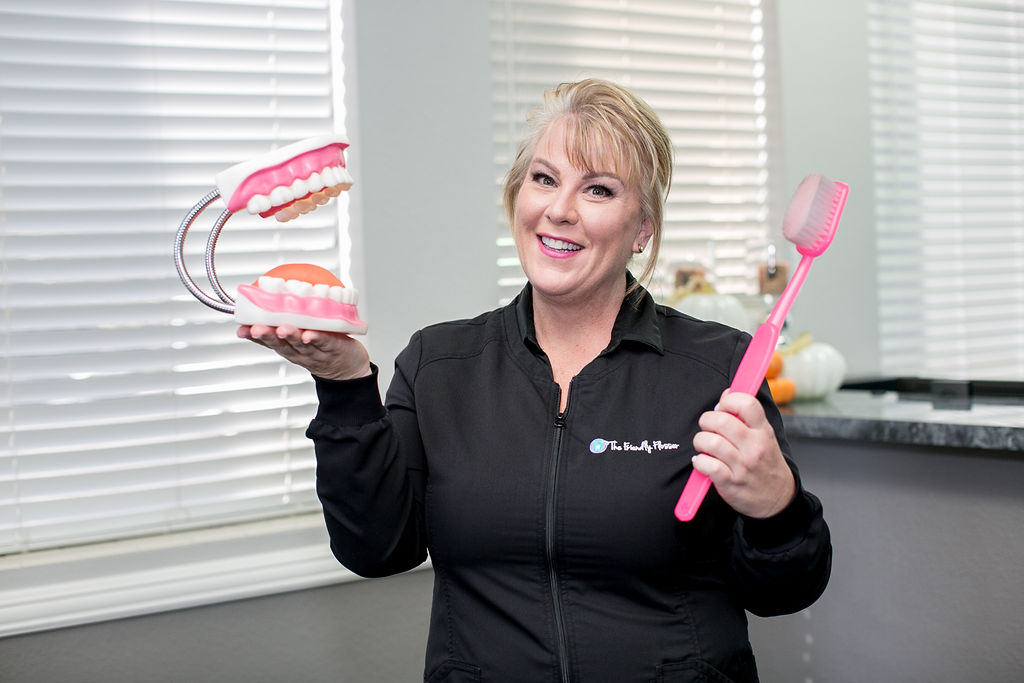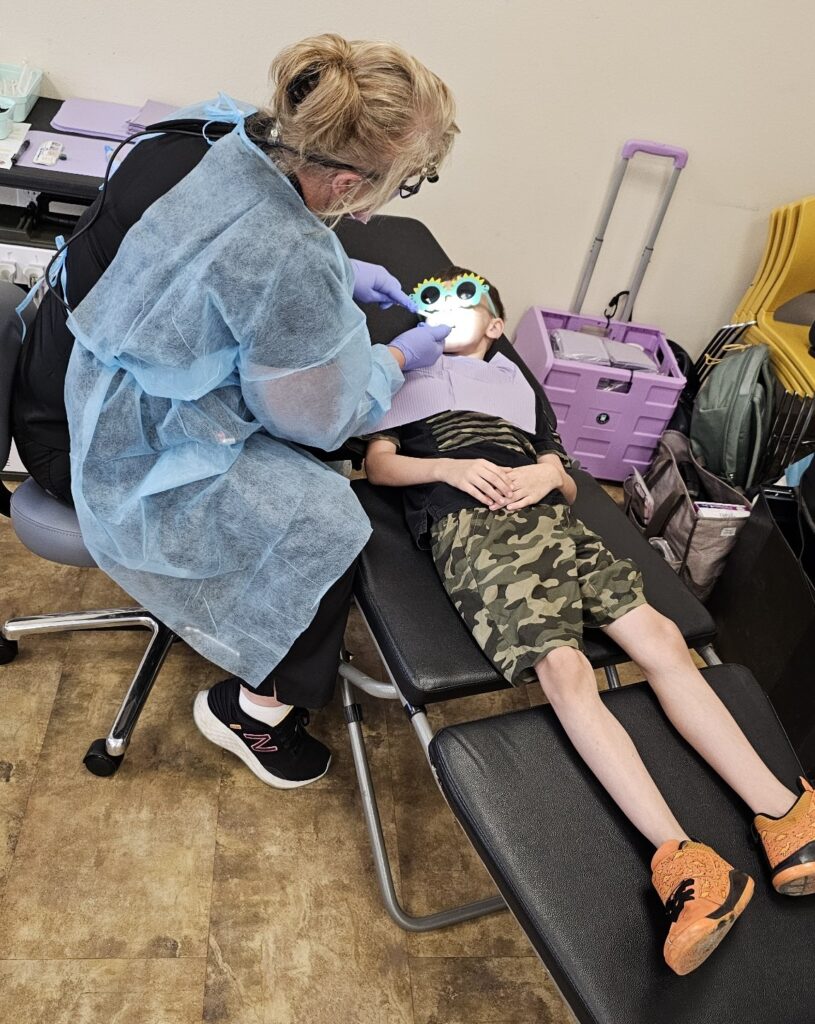One of the perks of being a member of RDHAP Connect is being featured in a member spotlight on our website and social media pages. Today we’re spotlighting Jennifer Nowotney, RDHAP.

Tell us a little about yourself. Where is your practice? Where did you attend dental hygiene school and take your RDHAP training?
Hi there, my name is Jennifer Nowotney! I started my dental journey as an RDA, and quickly realized I really enjoyed dental and continued to pursue my career as an RDH, graduating from Pasadena City College (PCC). I LOVE being a dental hygienist and heard about the RDHAP program and thought it sounded like an amazing opportunity to expand my scope of practice, and personal fulfillment, along with my professional growth and graduated from the RDHAP program at the University Of the Pacific (UOP) in 2013.
I have been in Public Health since 2016 and decided to start my own mobile hygiene practice in 2022, so here we are!
• What made you decide to become an RDHAP?
I decided to become a registered dental hygienist in alternative practice because I wanted to make a meaningful impact on people’s lives by promoting oral health in underserved communities. Traditional dental settings often limit the reach of preventive care, and I wanted to bridge that gap by offering services in alternative settings like schools and community centers.
My passion for this career grew out of a deep-seated desire to help those who face barriers to accessing dental care, whether due to financial constraints, geographic location, or mobility issues. By working in alternative practice, I can connect with individuals in their own environments, provide personalized care, and educate them on the importance of maintaining good oral hygiene. This approach allows me to make a difference beyond the confines of a traditional dental office, in a comfortable and familiar setting, aligning with my commitment to equity and preventative care.
• What type of RDHAP practice do you have? Do you practice where the patients live, work, go to school? Do you have a free-standing office? How does your practice model help increase a person’s ability to achieve good oral health?
My practice is completely mobile and serves over 120 locations throughout San Bernardino County and surrounding areas. I am currently in 7 school districts, over 35 State Preschools, as well as “pop-up” clinics at community events and resource centers. I am proud to say I have been able to provide some type of service to over 4,000 children in the past 2 years!
I feel that my dental hygiene practice model helps to increase the ability to achieve good oral health by minimizing barriers and bridging the gap in underserved areas by bringing my services to the community in need. Students can receive dental care without needing to leave school, eliminating barriers like transportation, scheduling conflicts, and time off work for parents. By providing screenings and preventive dental services in schools allows for the early detection of dental issues. I also make sure that every child we see gets a toothbrush kit to take home. This
model is what works for me, and I feel it reduces health disparities by ensuring that all students, regardless of their socio-economic status, have access to necessary oral health care.

• What do you do if you find your dental hygiene patient needs to see a dentist for care?
I feel it is important to use a team approach! I bring the prevention aspect to the school/event site but will refer to dental offices within the community for restorative care. I find it is important to establish a local dental home to be available year-round for comprehensive care, treatment, or emergencies so I provide those local dental resources to the families we see.
• How do your patients pay for your services?
I am a Medi-Cal Dental provider. For children who have PPO or Medi-Cal Dental insurance, we will bill for services provided. I am also a firm believer that no child should be turned away due to lack of dental coverage. Any child who is uninsured/ underinsured is seen as a courtesy and will not receive a bill.
• Once you complete their dental hygiene care, then what?
All children that I see get a “report card” that goes home informing the parents of the services that were provided, how the homecare looks, and any concerns that were noted. It also has a referral resource for a local dental office to contact if they do not have a dental home. For urgent cases, we will reach out to the families to inform them of our concerns and the need to get their child scheduled for a dental exam.
• Is there anything else you would like to share with patients, family members, or other health professionals who care for people who can’t care for themselves?
Certainly! An RDHAP can be an invaluable resource for patients, family members, and other health professionals who care for individuals unable to care for themselves or are in underserved
areas. RDHAPs are trained to provide compassionate, patient-centered care that respects the dignity and individual needs of each person, especially those who may have limited ability to care for themselves.
RDHAPs can conduct thorough oral health assessments, identifying potential issues early on. This is especially important for individuals who may not communicate discomfort or symptoms
effectively. They educate patients, caregivers, and families on proper oral hygiene practices, offering guidance on brushing, flossing, and diet to maintain oral health. They can refer patients to dentists or specialists when more complex dental treatment is needed, ensuring continuity of care. For individuals who have difficulty traveling, RDHAPs can provide care in the comfort of the patient’s home, nursing home, or other care facilities. This on-site care minimizes disruption to the patient’s routine and reduces the stress associated with traveling to a dental office.
Because RDHAPs work in alternative settings like homes, schools, and nursing facilities, they may be underutilized in areas where their services are most needed, simply because people don’t know they are an option.
This is why it is important to raise awareness about the role of RDHAPs and the importance of oral health in overall well-being. Offer presentations, workshops, and community outreach programs to
spread knowledge. Connect with other RDHAPs, dentists, public health professionals, and policymakers. Networking can lead to collaborations, support, and opportunities for growth. RDHAPs can transform the landscape of dental care. Now is the time to push boundaries, create lasting change, and ensure that everyone has access to the essential oral health services they deserve!
You can follow Jennifer Nowotney on:
Facebook: The Friendly Flosser
Or email Jennifer at: info@thefriendlyflosser.com
Are you an RDHAP and would like to be a part of our member spotlight? Become a member! Click below!
